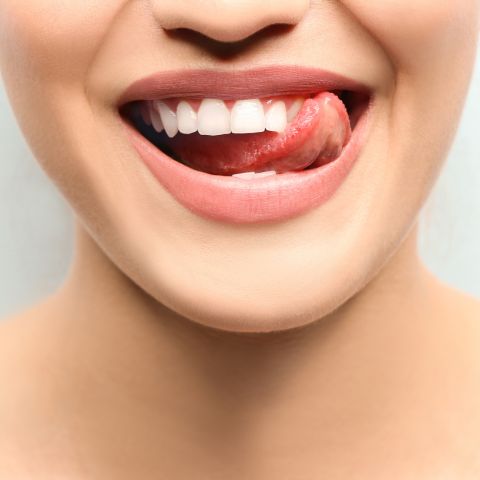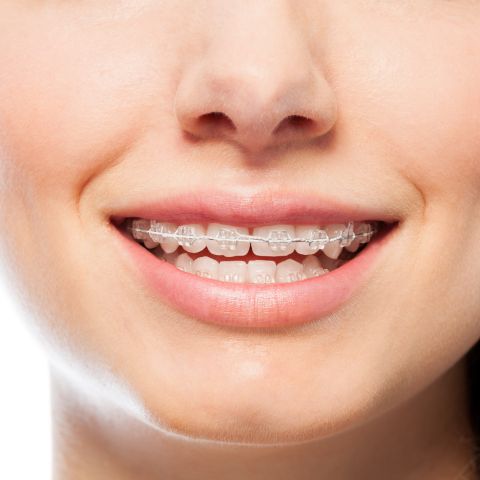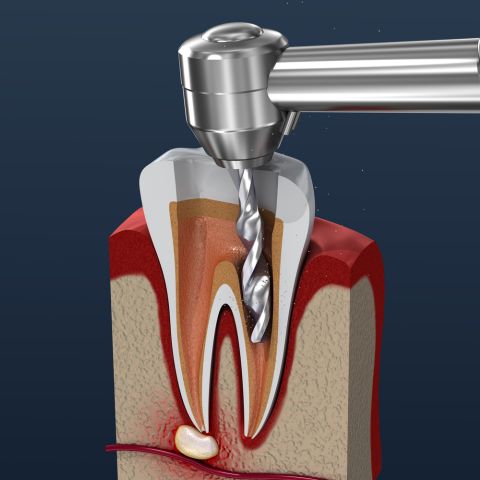

Zirconium crowns are a type of dental crown made from zirconia, a crystalline material known for its strength, durability, and biocompatibility. Unlike traditional crowns that may have a metal base or be made entirely from metals, zirconium crowns boast a natural, tooth-like appearance. They are specifically designed to blend seamlessly with the patient's natural teeth, ensuring aesthetics without compromising on function. Zirconium crowns provide a solution for individuals who seek dental restoration but also prioritize a natural and metal-free appearance.
Pros:
- Aesthetically Pleasing: Zirconium crowns have a translucent quality that closely mimics the natural look of tooth enamel, offering a more natural appearance compared to other materials.
- Metal-Free: As they don’t contain metal, zirconium crowns won't show a grayish line at the gum line, a common issue with traditional porcelain-fused-to-metal crowns.
- Biocompatibility: Zirconia is biocompatible, meaning it is well-tolerated by the human body and reduces the risk of allergic reactions.
- Durability and Strength: Zirconia is known for its toughness and can withstand significant biting and chewing forces, making these crowns very durable.
- Conservative Prep: Often, less tooth structure needs to be removed for zirconium crowns compared to other types, preserving more of the natural tooth.
Cons:
- Wear on Opposing Teeth: While zirconium is smooth, its hardness can cause wear on the opposing natural teeth if not properly polished.
- Potential for Brittleness: While zirconia is strong, like all ceramics, it can be brittle and may fracture if subjected to extreme forces.
- Cost: Zirconium crowns can be more expensive than some traditional crown types, though their longevity and aesthetics might justify the investment for many.
- Adjustability: Once fabricated, adjustments can be challenging, and doing so might weaken the crown or compromise its appearance.
- Translucency Variations: While generally considered a pro, the translucency might vary based on the thickness of the crown, potentially leading to slight aesthetic differences from natural teeth.
Determining candidacy for zirconium crowns is a personalized assessment based on several factors. Here are some general criteria to consider:
You might be a good candidate if:
- Aesthetic Concerns: You're seeking a natural-looking solution for a damaged or decayed tooth, and you prioritize an aesthetic outcome.
- Metal Allergies: You have sensitivities or allergies to metals commonly used in other dental restorations and require a biocompatible, metal-free option.
- Tooth Damage: You have a tooth that's significantly damaged or decayed but still retains a healthy root structure.
- Previous Dental Work: Existing dental work, like large fillings, might not provide sufficient support for the tooth, making a crown a viable solution.
- Endodontic Treatment: You've undergone a root canal, and the tooth requires added protection.
However, you might not be an ideal candidate if:
- Severe Bruxism: If you suffer from severe teeth grinding or clenching, the added pressure might not be suitable for zirconium crowns, or you might need to take additional precautions.
- Limited Tooth Structure: There isn’t enough natural tooth structure remaining to support a crown.
- Gum Disease: Active, untreated gum disease can compromise the foundation of any crown.
The procedure for placing a zirconium crown typically involves several stages, each tailored to ensure the perfect fit and appearance of the final product. Here's a breakdown of the process and its general timeline:
1. Consultation and Initial Examination: Before starting, your dentist will assess your oral health and specific needs. This appointment includes X-rays and possibly impressions to determine the crown's viability.
2. Tooth Preparation: The dentist will anesthetize the area to ensure your comfort. The tooth will then be reshaped, reducing its size slightly to make space for the crown. This step is crucial for the crown to fit seamlessly with neighboring teeth.
3. Impression Taking: Once the tooth is prepared, an impression (or mold) is taken. This mold serves as the blueprint for creating your custom zirconium crown. Some clinics might utilize digital scanning methods instead of traditional molds.
4. Temporary Crown Placement: To protect the prepared tooth and maintain aesthetics while the permanent zirconium crown is being crafted, a temporary crown will be placed.
5. Crown Fabrication: The impressions or scans are sent to a dental laboratory where the zirconium crown is meticulously crafted. This process can take anywhere from a few days to a couple of weeks, depending on the lab and specific patient requirements.
6. Crown Placement: Once the zirconium crown is ready, you'll return to the dentist. After removing the temporary crown and ensuring the new one fits perfectly, the zirconium crown is cemented or bonded into place.
Although the exact duration may vary depending on individual needs and clinic procedures, in general:
- The initial consultation, tooth preparation and placement of the temporary crown can take place in a single visit, lasting 1 to 2 hours.
- Crown making usually takes between 1 and 2 weeks.
- The final crown appointment usually lasts one hour.
In total, from the first visit to the final installation, the entire process can take 2 to 3 weeks. However, some clinics with in-house labs or advanced technology may offer expedited services.
Zirconium crowns are renowned for their durability and strength. With proper care and under normal conditions:
- Lifespan: A zirconium crown can last anywhere from 10 to 20 years, and in some cases, even longer. Its longevity largely depends on oral hygiene practices, regular dental check-ups, and avoiding behaviors that can damage the crown, like using teeth as tools or biting on very hard objects.
- Wear and Tear: While zirconium is robust, like natural teeth, it can still undergo wear over time, especially if one grinds or clenches their teeth frequently.
How to Care for Zirconium Crowns:
- Regular Oral Hygiene: Brush at least twice daily using a fluoride toothpaste and floss once a day. While the crown itself cannot decay, the edge where the crown meets the gum can still be vulnerable if not kept clean.
- Dental Check-ups: Regular dental visits (typically every 6 months) will help ensure that the crown remains in good condition and can help spot any potential issues early on.
- Avoid Hard or Sticky Foods: To prevent chipping or dislodging the crown, avoid habits like chewing ice, biting fingernails, or eating very sticky candies.
- Wear a Mouthguard: If you engage in contact sports or activities where facial injury is possible, wearing a mouthguard can protect your crown and natural teeth. Similarly, if you grind or clench your teeth, a night guard might be beneficial.
- Stay Informed: Stay attentive to any changes or discomfort. If the crown feels loose, contact your dentist immediately. Additionally, if you experience discomfort or sensitivity, it's essential to schedule a dental visit.
- In essence, while zirconium crowns are designed to be long-lasting, their durability can be significantly enhanced with proper care and regular dental visits.
Turkey has become a renowned destination for medical tourism due to its ability to provide high-quality medical services at a fraction of the cost found in many Western countries. This affordability stems from favorable exchange rates, lower operational and labor costs, and the nation's commitment to becoming a leading healthcare hub, which translates to competitive pricing for patients.
In Western European countries like the UK, France, or Germany, the cost for the same crown can range from $600 to $1,200 USD or even more, depending on the clinic and location. In the United States, the price can be even steeper. Zirconium crowns can range anywhere from $1,000 to $2,500 USD or more per crown, varying based on the dentist's expertise, location of the clinic (with urban areas typically being more expensive), and specific patient needs.
Turkey has become a hub for medical tourism, including dental treatments, primarily because of the high-quality services offered at relatively lower prices. The cost for a zirconium crown in Turkey ranged from $150 to $400 USD.
1. Expertise & Excellence: At Elara Medical Tourism, we pride ourselves on collaborating with some of Turkey's most skilled and experienced dental professionals, ensuring that you receive top-tier care.
2. Affordability without Compromise: While we offer competitive prices, especially when compared to Western Europe and the USA, we never compromise on quality. You get world-class dental services at a fraction of the cost.
3. Personalized Care: We understand that every patient's needs are unique. From the initial consultation to post-procedure check-ups, we tailor our services to best suit your specific requirements.
4. Comprehensive Services: Beyond the dental procedure, we facilitate a smooth medical tourism experience, assisting with travel arrangements, translator, accommodations, and ensuring your stay in Turkey is comfortable and hassle-free.
5. Advanced Technology: We stay abreast of the latest developments in dental technology, ensuring that our patients benefit from cutting-edge techniques and equipment.
6. Transparent Communication: We believe in open and clear communication. All your concerns and questions will be addressed promptly, ensuring you're well-informed throughout the entire process.
7. Trust & Reputation: Elara Medical Tourism has built a reputation for trustworthiness and excellence in the realm of medical tourism. Our numerous satisfied patients from the UK, USA, and beyond are a testament to our commitment to quality care.
In essence, by choosing Elara Medical Tourism, you're opting for a seamless experience that blends superior dental care with the beauty and hospitality of Turkey. We're dedicated to ensuring your journey to a brighter smile is smooth, efficient, and pleasant.



